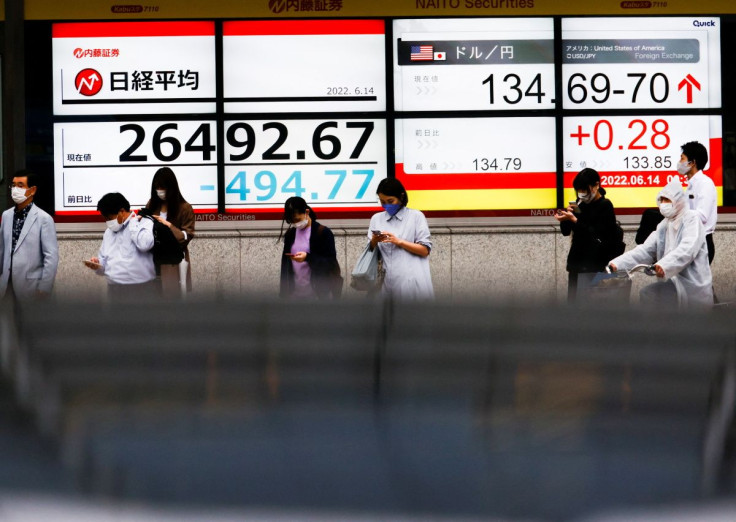Asian Stocks Slide As Fed Hike Fears Tip Wall St Into Bear Market

Asian shares slid sharply and the safe-haven dollar held near a two-decade peak on Tuesday after Wall Street hit a confirmed bear market milestone on fears aggressive U.S. interest rate hikes would push the world's largest economy into recession.
MSCI's broadest index of Asia-Pacific shares outside Japan fell 0.45% in volatile trade, clawing back some of its earlier losses.
Australia's benchmark S&P/ASX200 closed 3.55% lower while Japan's Nikkei stock index was down 1.32%, having fallen as much as 2% earlier in the session.
The negative tone in Asia followed a bleak U.S. session on Monday, which saw Goldman Sachs forecast a 75 basis point interest rate hike at the Federal Reserve's next policy meeting on Wednesday.
However, investors appeared to be shaking off the gloom heading into European trade with the pan-region Euro Stoxx 50 futures up 0.83%, German DAX futures 0.9% higher and FTSE futures rising 0.62%. U.S. stock futures also added 1.17%.
"While there is clearly a risk from a significant policy tightening, it remains unlikely that there will be a fully fledged recession, with the unemployment rate jumping by two or more percentage points," said Stephen Koukoulas, managing director at the Canberra-based Market Economics.
"Rather, it is certain growth will slow - which is the aim of the policy tightening - and by late this year, inflation pressures should start to ease."
In Hong Kong, the Hang Seng Index pared earlier losses to be up 0.26% after trading in negative territory for most of the day. China's CSI300 Index retraced some of its lost ground to be off 0.23%.
Expectations for aggressive U.S rate hikes have risen after inflation in the year to May shot up by a sharper than predicted 8.6%.
"The U.S. market is the biggest in the world so when it catches a cold the rest of the world does as well," said Clara Cheong, global market strategist at JP Morgan Asset Management.
"There will be short-term volatility in Asia but we think in the medium to longer term in Asia ex-Japan, earnings expectations have already been downgraded so there is a relatively brighter outlook here than other parts of the world."
Cheong said China monetary easing and the re-opening of ASEAN economies from COVID-19 lockdowns could shield the region from some of the financial market fallout.
On Wall Street overnight, fears of a U.S. recession kicked the S&P 500 down 3.88%, while the Nasdaq Composite lost 4.68%. The Dow Jones Industrial Average fell 2.8%.
The benchmark S&P 500 is now down more than 20% from its most recent record closing high, confirming a bear market, according to a commonly used definition.
Benchmark 10-year Treasury yields hit their highest since 2011 on Monday and a key part of the yield curve inverted for the first time since April as investors braced for the prospect that Fed attempts to stem soaring inflation would dent the economy.
The yield on benchmark 10-year Treasury notes rose to 3.3466% compared with its U.S. close of 3.371% on Monday. The two-year yield, which rises with traders' expectations of higher Fed fund rates, touched 3.3804% compared with a U.S. close of 3.281%.
In currency markets, the dollar index, which tracks the greenback against a basket of major currencies, was at 104.98, just off a two-decade peak of 105.29 it hit on Monday.
Against the Japanese yen, the U.S. currency was at 134.59, just below its recent high of 135.17.
The European single currency rose 0.2% to $1.0432, having lost 2.8% in a month.
Bitcoin fell around 4.5% on Tuesday to $21,416, a fresh 18-month low, extending Monday's 15% fall as markets were jolted by crypto lender Celsius suspending withdrawals.
Oil markets began to recover late in the Asian session with U.S. crude up 0.13% at $121.08 a barrel, having traded down most of Tuesday. Brent crude firmed slightly to $122.42 per barrel.
Gold shrugged off a weaker start with the spot price gaining 0.42% to $1,826.65 per ounce. [GOL/]
© Copyright Thomson Reuters 2024. All rights reserved.




















